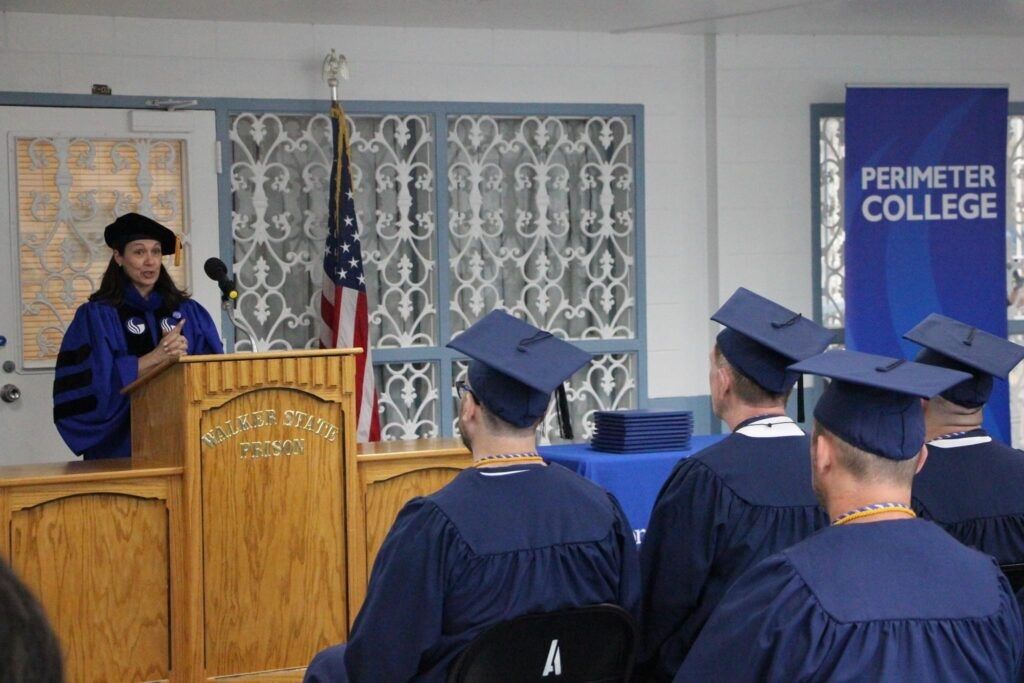Georgia State University pulls the plug on prison education
Published 3:51 pm Sunday, March 24, 2024

- Georgia State’s decision means that around 60 current students, according to numbers provided by faculty, at two state prisons and one federal facility may have to postpone their dreams of earning a degree inside.
ATLANTA — Georgia State University is blaming federal rules for the return of Pell Grants as a primary reason for its decision to close its prison education program this summer.
The program won’t admit any new students but the university said it has a plan to help currently enrolled students at two state prisons finish their programs, which could take up to two years.
Trending
Officials cited the administrative challenges of securing federal financial aid, as well as a $24 million budget shortfall, as factors leading to the university’s decision to halt classes at three correctional facilities, according to a statement sent to Open Campus. The program has been operating since 2016.
Pell Grants are the federal financial aid for low-income students. In July 2023, incarcerated students became widely eligible for the grants for the first time since the 1994 crime bill, which banned federal financial aid for prison education. More than 750,000 students are now eligible for aid, but they must be at a correctional facility that offers a college program approved by the federal Education Department.
Georgia State’s decision means that around 60 current students, according to numbers provided by faculty, at two state prisons and one federal facility may have to postpone their dreams of earning a degree inside. Incarcerated college students already face significant challenges in completing their degrees because of course disruptions and other interruptions outside of their control.
“These students have been disappointed in their lives over and over and over again,” said Katherine Perry, an English professor at Perimeter College, which is part of Georgia State. She was one of the three faculty members who co-founded the prison education program in 2016.
“For me, it’s so important that they not put education in that bucket of things that let them down because that’s why most of them didn’t get their education before.”
Perry felt blindsided when faculty and staff received an email at the end of November from Cynthia Lester, interim dean of Perimeter College, announcing the decision. The email cited “financial constraints and the substantial administrative demands” of seeking Pell approval from the federal Education Department.
Trending
“The decision was not made lightly, but it does reflect the university’s commitment to responsible fiscal management and ensuring existing educational initiatives receive the necessary support and resources,” Lester wrote in the email.
Perry said the program has faced financial challenges in the past but they have always been allowed to fundraise. “In this case, when we went back to say, ‘Can we just raise the difference?’ they said no,” she said. “And that makes me scratch my head.”
The program has received at least $700,000 in grants since 2022, which may help fund the program for continuing students. In 2023, Georgia State also received a $669,000 grant from the Mellon Foundation to fund a literary journal through the prison education program.
Students at the two state prisons have also been able to use Pell Grants since 2020.
According to the statement, Georgia State faced a substantial budget cut of $24.4 million in fiscal year 2024 and anticipates another shortfall next year. The university estimated that the instructional and administrative costs of operating its prison education program across three correctional facilities would be around $180,000 in addition to money that they have received from donors.
The university also noted the challenges of meeting the “complex requirements” and “ongoing commitments” of the Pell application process, including navigating the paperwork for the federal Education Department, the accreditation process, and meeting key indicators such as job placement, expected earnings, recidivism rates, and completion rates. The spokesperson also expressed concerns about Georgia State’s ability to commit to providing services such as tutoring, counseling, and career guidance to incarcerated students.
Georgia State is exploring alternative avenues to recognize “the importance of supporting the educational needs of individuals impacted by incarceration,” including discussions with donors to establish a new program catering to students who have a personal experience with incarceration, according to the statement.
Big questions about the future
Last week, Georgia State students launched a campaign calling on the university to reverse the decision. As of Wednesday, 46 faculty members had also signed a letter of support asking Provost Nicolle Parsons-Pollard to continue the program.
Some experts in the field are also concerned about what Georgia State’s decision to shutter its program might foreshadow for other college-in-prison programs across the state and country.
“We have the fourth largest prison system in the country and we have a really underserved population here,” said Stacy Bell, an English professor at Emory University and board member of the Georgia Coalition for Higher Education in Prison. “And without Georgia State, it raises really big questions about what’s happening to the higher education-in-prison movement here in Georgia.”
There are currently around 50,000 people incarcerated in the state. The Georgia Department of Corrections did not respond to a request for comment.
Ruth Delaney, director of the Unlocking Potential initiative at the Vera Institute, a nonprofit that provides technical assistance to prison education programs, expressed disappointment at the decision.
“The federal regulations for Pell-funded prison education program require colleges to deliver postsecondary educational programming that is of comparable quality to that which the students at the other location of the college receive,” she wrote in an email. “Many of the services, reporting, and processes GSU describes are standard practices that accredited colleges already follow to serve their non-incarcerated student bodies.”
Last May, nine men at Walker State Prison in Rock Springs earned their associate’s degrees from Georgia State, becoming the university’s first class to graduate inside. Three more incarcerated students at Phillips State Prison in Buford graduated in December.
Around 19 students at the federal United States Penitentiary Atlanta started their associate’s degree in September through Georgia State. In January, university officials announced they would no longer be continuing to offer classes at the penitentiary. Georgia State then asked the University of West Georgia, which is planning to launch a Pell-funded bachelor’s program at the federal facility in the fall, if they would accept the associate’s students, according to Tiffany Parsons, a sociologist and director of West Georgia’s prison education program.
West Georgia currently offers classes toward a bachelor’s degree to one cohort at Hays State Prison, a maximum security men’s prison. It’s one of two prison bachelor’s programs in the state, Parsons said.
The other four-year program is offered at Lee Arrendale, a women’s prison, through Life University. That program is also in flux after corrections officials announced last year they were downsizing the prison.
Faculty have been working with the students at the penitentiary to help with the transition, Parsons said. She will be going into the federal facility to better understand what the students’ needs are and what kinds of support services West Georgia can provide going forward. “We will have to be there a while and earn those students’ trust,” she said.
The incarcerated students were informed about the decision in mid-February. Perry, the English professor, said her students at Walker seemed fearful that they wouldn’t be able to finish their degrees, despite assurances that Georgia State had a “teachout plan,” including the possibility of another college picking up the program in the state prisons.
“Maybe it’s because they’re so used to systems letting them down,” Perry said.
A teachout plan outlines how an institution will help its students graduate if it stops operating before all students have completed their programs. Georgia State did not respond to follow-up questions about the details of its plan.
Many of the students who graduated in 2023 began their associate’s program when the program started in 2016, so it’s unclear how the current students, most of whom started last fall, will finish within two years.
Perry said the students asked her to quantify the odds that they’d be able to finish with Georgia State. One student felt particularly strongly about graduating from the same college because his kids were also enrolled at the university.
Just like on the outside, incarcerated students feel that being at a particular college is part of their identity as a student. “That’s what it means to be a proud Panther,” Perry said.





